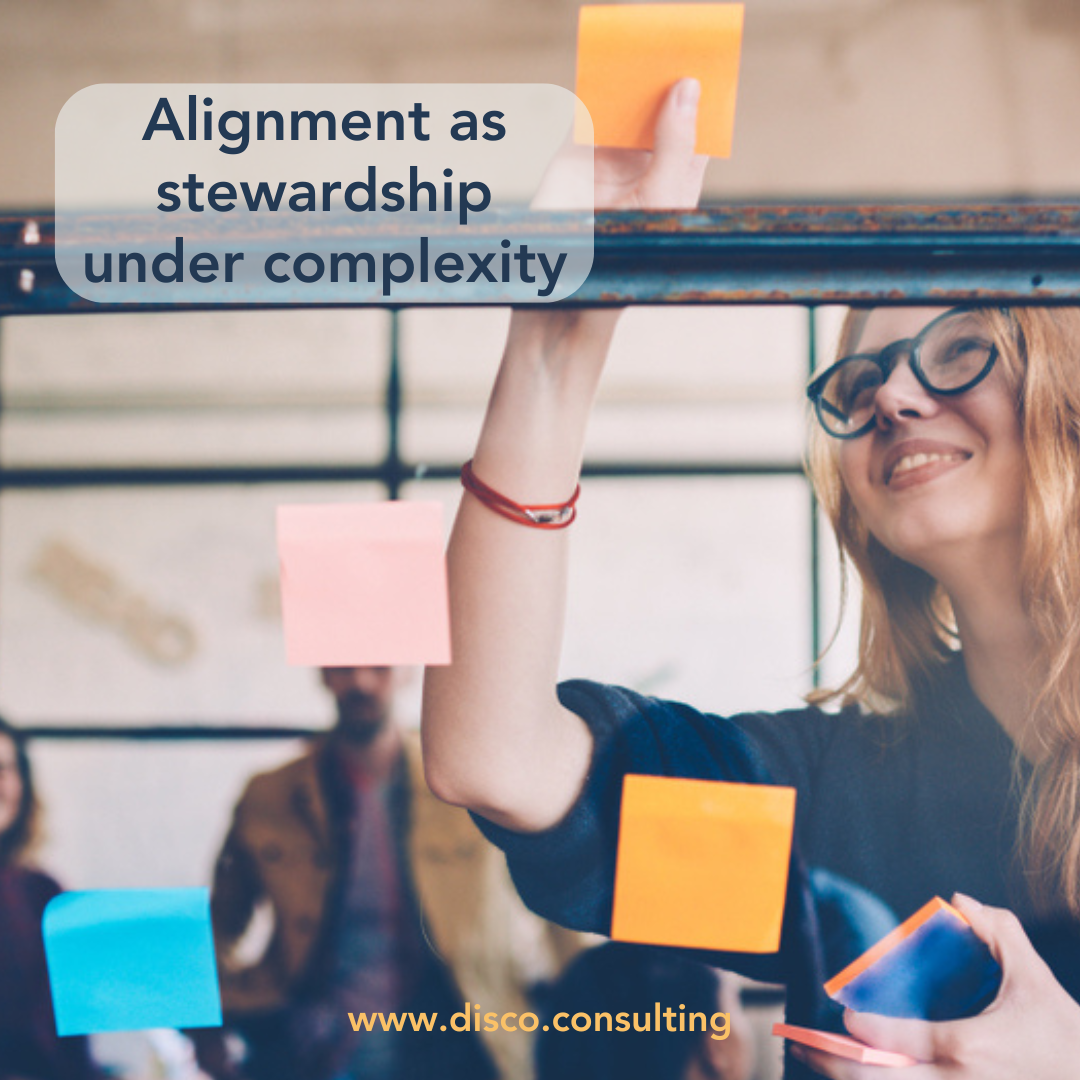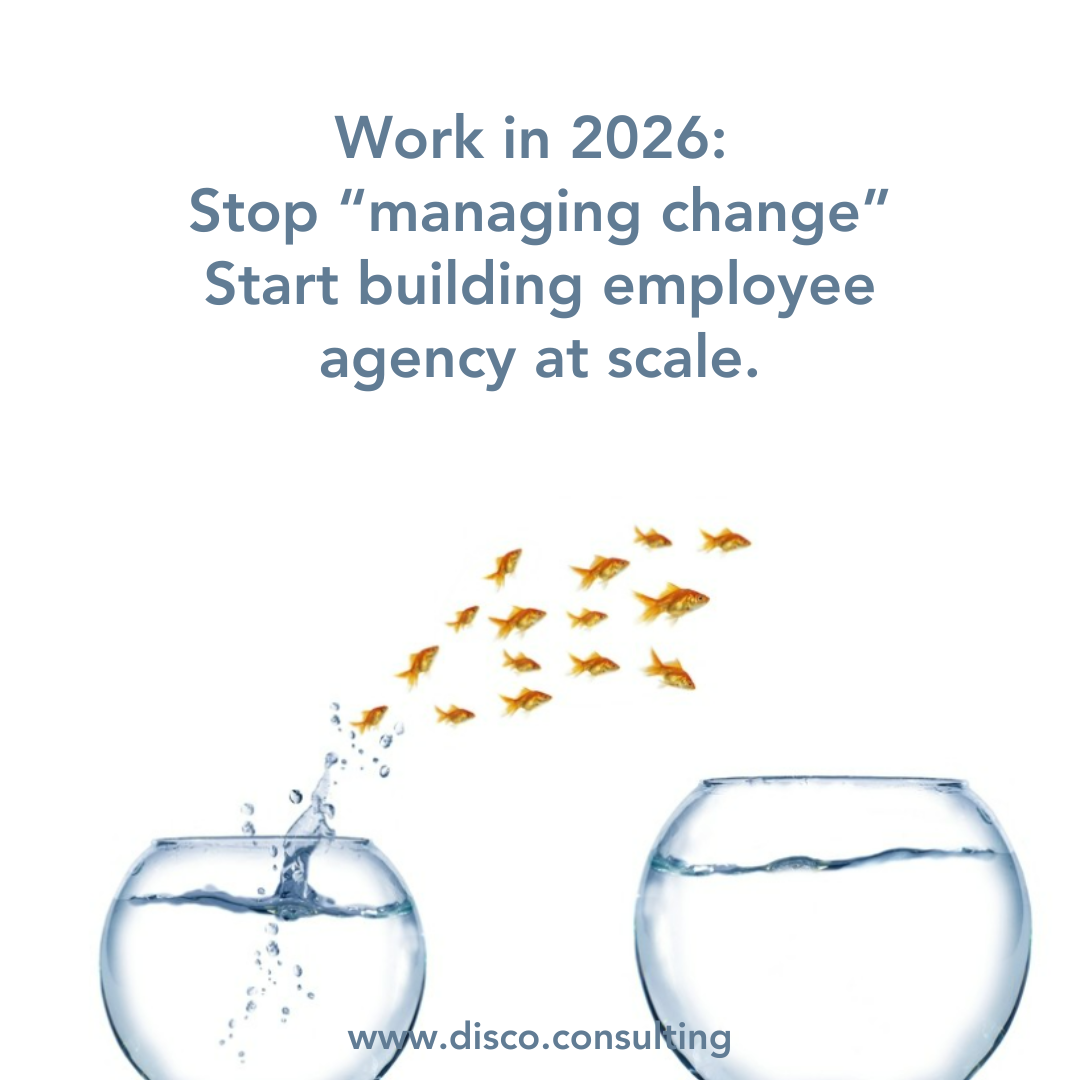discover our DISCO TRACKS
Ideas we’re exploring and things we’re working on
☆ Dive right in and look around ↓
Stop restructuring. Start designing for alignment.
Most organisations don’t fail because they lack a strategy. They fail because their design can’t carry the strategy’s weight.
Organisational design is the strategic work of shaping how a company’s roles, processes, systems, and culture fit together to deliver on its goals - consistently, efficiently, and with enough adaptability to survive the real world. It’s a blueprint for how the organisation actually functions. It defines how people work together, make decisions, share information, and use resources to create value. Not just boxes on a chart.
Working on the edge of organisational design.
If you’re an org design practitioner (or you’re aspiring to become one), here’s the thing you learn fast: org design isn’t a re-org. It’s an operating system upgrade.
When we treat design as shifting reporting lines, renaming teams, creating a new layer (or removing one) we might get a short burst of clarity. But we rarely solve the underlying problem: the organisation’s design no longer fits its strategy, environment, or stage of growth.
Practitioners work in that gap.
Alignment as stewardship under complexity
Where lack of alignment shows up first
Over the past few years, I’ve been spending time with organisations that don’t often make national headlines.
They are member-based institutions, regional system stewards, and organisations with long-term obligations to communities rather than markets. They operate under contested mandates, close governance scrutiny, and high expectations of trust.
What’s struck me is not that their challenges are unique but that they are early.
Work in 2026: Stop “managing change”. Start building employee agency at scale.
Across Australia, the forces hitting organisations all at once are bigger than any single transformation program: AI and automation are reshaping roles, cost-of-living pressure is changing what “security” means, hybrid work is now the default (not the experiment), and the skills shortage is squeezing everything from healthcare to construction to tech. Add geographic dispersion, regulation, and the reality that people can leave faster than you can backfill.
The mislabelled emotions of leadership
Most of what we call workplace conflict isn’t really about work at all. It’s about feelings, the ancient, unexamined, beautifully messy feelings that we drag into our meetings, our relationships, and our leadership roles without realising they were never born in the boardroom. The key word here is born. They began with our nervous system finding safety, reward and belonging in our human families of origin, our communities and our institutions of our early years, and continue on, unsurfaced as our neural safety responses to relational safety.
Organisations as Living Ecosystems
When we walk into an organisation, we often see structures: buildings, teams, hierarchies, budgets, and dashboards. But the real power? It lives in the spaces between these things.
Organisations aren’t machines. They’re living, breathing ecosystems. And like any ecosystem, they’re shaped not just by the visible elements, but by the invisible forces that flow beneath the surface: culture, relationships, values, narratives, and power dynamics.
The quiet architects of change
There’s a particular kind of work that asks you to stand at the meeting point of paradox.
To think like a strategist and feel like a human.
To hold the pulse of an organisation while also holding its people steady.
If you work in People & Culture, Organisational Development, or change - you already know this terrain. You live in the space between structure and story.
Limits aren’t limitations, they are leadership optimisers
We’ve crossed a quiet threshold in leadership. Somewhere between the push for productivity and the mythology of high performance, we’ve begun to believe the memes and started treating people as if they were limitless. We began to speak about ‘capacity’ like a dial that can be endlessly turned up if only we find the right system, the right motivation, or the right piece of tech. But human beings are not machines. We are biological organisms with nervous systems that crave rhythm, rest, and recovery. When we override those cycles- individually, collectively or organisationally- we start paying compound interest on depletion.
Why leaders who coach unlock more than performance
Let’s be real… most of us don’t wake up in the morning thinking, “I can’t wait to be managed today!” But… we do thrive when someone believes in us. When they challenge our thinking and support us to grow. That’s where coaching conversations come in.
The underground network
In the hush of a forest floor, far below the surface, a complex, intelligent system thrives - weaving fungi and roots into vast, cooperative networks that feed, warn, protect, and regenerate the entire ecosystem. It’s called the mycorrhizal network, often dubbed the “Wood Wide Web.” And it turns out, the most effective leaders today have more in common with these fungal superstructures than they do with command-and-control hierarchies of the past.
At DISCO, we believe future-ready leadership isn’t about being at the top of the tree. It’s about being part of the network that sustains the forest. Here's why.
Leadership is a system, not a role
We don’t build leadership pipelines. We build leadership ecosystems.
Leadership is too often treated like a ladder. A linear progression toward positional power. A title. A box in the org chart.
But in complex systems, leadership doesn’t follow the hierarchy. It moves through networks, relationships, influence, and decision-making at every level.
Tension is not the problem. It’s the signal.
In adaptive, human systems, tension shows up when something is trying to shift - but hasn’t fully arrived yet. It reveals where identities are evolving, strategies are misaligned, or cultural norms are bumping up against emerging needs.
Rather than rushing to resolve or smooth over that discomfort, what if we tuned into it? Let’s explore how this shows up through the lens of the three communities we work most closely with at DISCO.
Connection as a Catalyst
The currency of change is connection. In times of complexity and uncertainty, people don’t need more control. They need coherence. They need leaders who can stay present in the messy middle.
Alignment isn’t Enough: The case for flourishing systems
Traditional alignment focuses on structure and execution - roles, reporting lines, performance goals. But organisations aren’t machines. They’re living systems made up of people who think, feel, adapt, and relate. When the human energy inside the system starts to fade, no amount of alignment will carry you through disruption, let alone help you thrive.
Flourishing in Tension: embracing duality in the pursuit of human wellbeing
When we speak of human flourishing, it’s tempting to imagine a life free of friction — one where joy, health, purpose, and security flow without resistance. But as the data from The Global Flourishing Study and a growing body of global scholarship reveal, the reality is more complex, more human, and, perhaps, more hopeful.
You Are the System: HR’s Power to Shape Thriving Workplaces
Reclaiming the power of HR to design flourishing organisations.
Dear People Leaders, Culture Builders, and Architects of Organisational Life… it’s time we remembered who we are.
You are not just policy writers, culture consultants, or change managers.
You are designers of the system.
You are custodians of human potential.
You are influencers of what it feels like to work here — and what is possible because of it.
From Stabilising to Flourishing: reframing the consultant’s mandate
Historically, most organisations bring in consultants when something is broken. A team is faltering, a system has failed, leadership is stuck, or culture is fraying. The brief is often urgent, and the ask is clear: stabilise what’s not working. More recently it’s been for shorter arrangements coaching specific leaders or to deliver training to a wider group in the hope things overall get better.
It’s time to reframe the consultant’s role.
The heart of human flourishing
Inspired by insights from The Global Flourishing Study
In a world increasingly dominated by digital interactions, global mobility, and rapid change, one timeless truth continues to emerge from the latest research into human wellbeing: we flourish best when we are connected.
The neuroscience of flourishing and leadership: connection is the key
The convergence of findings from the Global Flourishing Study and the neuroscience of leadership underscore a compelling truth: human connection is not a peripheral aspect of organisational life, rather it is central to it. By embracing person-centered neuroleadership and cultivating environments rich in psychological safety, organisations can unlock unparalleled levels of flourishing, innovation, and resilience. In doing so, they not only enhance performance but also contribute to the flourishing of their people in all their connections.
The Metrics of Meaning: what SHAPE Global teaches us about organisational needs
Flourishing is not a trend or a vibe. It’s a measurable, evidence-based state of thriving—and we can track it.
Work should be more than just a place where people clock in, do the doing, and drag themselves through the week.
That’s where flourishing comes in.




















